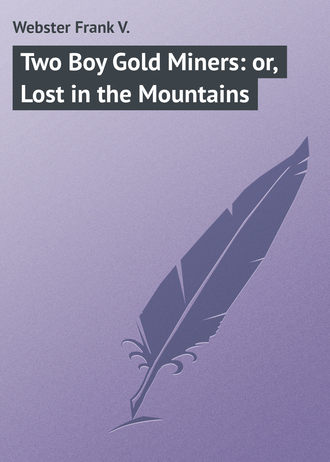 полная версия
полная версияTwo Boy Gold Miners: or, Lost in the Mountains
After supper, when they were all seated about the campfire, the men smoking and telling stories, to which the two boy gold miners listened eagerly, one of the men remarked:
"I believe it is going to blow up a little rain."
The evening sky was beginning to be overcast with clouds, and there was a moaning and sighing to the wind, as if it bemoaned the fact that the pleasant scene was so soon to be spoiled by a storm.
"Better look to our tent-ropes, boys," suggested Gabe, for he and the two lads from the farm bunked together in a small tent that had been brought along. "I don't want it blown away in the night, and have us all get soaking wet."
The darkness increased more rapidly, now that the sky was becoming thickly covered with clouds, and the wind grew stronger.
"Say, do you notice anything queer?" asked Jed of Will, as they stood together on a little jutting point of rock and looked over the valley spread out below them, a valley now shrouded in gloom.
"Something queer? How do you mean?"
"I mean like when your foot goes to sleep, and you try to walk on it."
"As if pins and needles were all over you?" asked Will.
"Yes, that's it."
"I did notice something like that," admitted his brother, "but I didn't think it was anything. It's growing worse, though."
"You're right, it is. Let's ask the men and old Gabe if they feel it. Why, it's just like an electric battery now."
The boys looked at each other curiously and in some alarm. They were both now conscious of a very peculiar sensation. Their flesh all over was tingling as if tiny needles were being brushed against them.
"Do you notice anything queer, Gabe?" asked Will.
"Queer!" exclaimed the miner. "I should say I did. It feels like ginger ale tastes."
"That's it," remarked one of the men. "I was wondering what was the matter with me."
The miners and the boys were ill at ease. There seemed to be something strange in the air about them – some unseen influence at work. They looked all around. The storm was evidently coming closer. The wind was now blowing quite a gale, and there were occasional mutterings of thunder.
"The horses feel it, too," observed Ted. "I don't like it here. I wish we'd kept on, or else stopped down below."
Hardly had he spoken than there came a vivid flash of lightning, followed an instant later by a startling clap of thunder. But it was not the lightning which caused every one in the camp to jump sharply. Nor was it the thunder.
"Did you feel that?" cried Jed.
"I should say I did," answered Will. "A regular electric shock, that's what it was. Felt as if I had hold of the business-end of a battery."
There came another flash of lightning, a far-off one, for the forked tongues of it shot down behind a distant, towering peak, but the effect on the little party of gold-seekers was even more pronounced than before. Gabe fairly leaped into the air, in spite of his injured leg.
"Tarantulas and centipedes!" he cried. "Something's the matter!"
"We're on top of a natural electric battery!" shouted Ted Jordan.
"No, we're not, but it's almost as bad," spoke one of the men. "I know what it is."
"What then?" cried several.
"We're on a part of the mountain that's filled with iron ore. The electricity is attracted to it, and we're getting shocks from it. I was in a place like this once before, out in Australia, and a lot of natives were killed during a storm. The iron ore acts just like a live wire."
"Then we'd better get off," said Will. "I don't want to be electrified any more."
"Move's the word, and we can't be any too quick," spoke Gabe.
There came another flash, and once more the gold-hunters felt the sensation of pins and needles. They noted, too, that the storm seemed coming more rapidly toward them.
"Up stakes and vamoose!" shouted one of the men, who had been living on a ranch. "Let's get away from here before it's too late."
"It'll be worse when the rain comes," stated the man who had explained about the iron ore causing the trouble. That his theory was right was admitted by all the miners, when they had examined the character of the ground on which they stood. They lost no time in breaking camp, and they had only gotten the tents down and re-arranged the packs on the horses, when the storm broke in a fury of wind and rain.
Fortunately, this outburst seemed to take the edge off the electrical outburst, and they were hoping they would escape without any more shocks. But it was a vain hope. When the ground was thoroughly wet there came such a sudden glare of lightning that it nearly blinded every one. The crash of thunder was not an instant in following, and such an electrical shock resulted that one of the men was knocked down. As for the horses, they were so frightened that it was with difficulty that they could be controlled.
"Hurry up!" cried Ted Jordan. "We're likely to be killed if we stay here. Hurry, every one!"
The man who had been knocked down arose with a curious look on his face. He ran at top speed until he came to a spot about five hundred yards from where the others were.
"It's all right here," he cried. "No iron ore here. You'll be safe when you get here."
They made all haste to join him, slipping, stumbling and leaping over the rough way. The rain was falling in torrents, and even the slight discharges of electricity that followed the one big flash set their flesh to tingling, and made them fear that worse was to follow.
But they got safely across that patch of ore, and were soon on neutral ground. There they tried to establish a camp, but it was hard work in the storm. The boys helped as best they could, and so did Gabe, but his leg pained him too much to allow him to do a great deal.
At length, however, something like order was brought out of chaos. It was out of the question to get tents up, so strong did the wind blow, but the men used the canvas to shelter them somewhat from the downpour. The horses were tethered to trees in the open.
"Look there!" cried Jed suddenly, pointing to the spot of ore which they had left. They all looked and beheld a curious sight. Right on the place where they had first camped the ground seemed covered with tiny blue and green spots. They leaped about here and there, and some seemed like tiny flames.
"It's the electricity," called the man who had explained about the effect of the lightning on the iron ore. "A connection has been made because of the rain, and that place is now charged like a battery. It's a good thing we got away from there."
They all congratulated themselves on this score, and watched with curiosity, not unmixed with fear, the curious play of the lightning and the tiny flames seeming to come up from the earth.
The rain kept up for an hour more, and then ceased. By that time it was impossible to light a fire, so they had to eat cold victuals; but they did manage to get up the tents, though it was as bad inside them as it was out, for they were soaking wet.
But they all accepted it as part of the game they were playing, and as part of the price they had to pay for gold. The night seemed as if it would never end, but morning came at last, and with the advent of daylight every one felt better. The old miners knew how to get dry wood from the inside of hollow logs, and soon, over cups of steaming coffee, the terrors and discomforts of the night were forgotten.
"Forward!" cried Gabe when breakfast was over and the packs adjusted. "Now for the place of the nuggets. You boys will have to show us the way soon."
"We can do that, all right," declared Jed. "We'll show you where we hid the nuggets."
They traveled on all the rest of that day. Jed and Will were able to direct the men along the same trail they had taken in retreating from Con Morton and his gang. As they advanced the various landmarks were pointed out by the lads.
"We're 'most there now," said Will as they turned around a shoulder of the mountain and set off at right angles to the way they had been going. "We'll be there in half an hour now."
"Just in time to dig out about a thousand dollars' worth of the yellow boys and have grub," remarked Ted Jordan. "Well, it can't happen any too soon for me, boys. I've been down on my luck lately, and I need a change."
They pressed on more eagerly, the two boys in the lead, as they alone knew where the secret spot was.
"Here's the place!" cried Will at length.
"No, it isn't," declared Jed. "It's farther on."
"It's here," insisted Will. "Don't you remember this big rock? I said at the time that the nuggets were about five hundred feet from it."
"Which way?" asked Gabe quickly. "That's important to know."
"Right in line with that dead tree," answered Will. "I'll show you."
He walked confidently to the spot.
"Yes, that's it," spoke Jed, convinced that his brother was right.
Will began to dig, while the men gathered about him, with eager eyes watching him. It meant a lot to them, for some of them were down to their last dollar, and a rich strike would prove a fortune to them.
"Did we put 'em as deep as that?" asked Jed, when Will had removed considerable dirt and had not come upon any of the precious yellow nuggets.
"Must have, but I don't remember that we went very deep."
"Let me have a try," suggested Ted. "I'll soon turn 'em out."
He took the pick from Will and began to dig. He went quite deeply into the ground, and turned it up for some distance in a circle. But there were no nuggets.
"They're – they're gone!" gasped Will at length.
"Somebody's taken them! Morton and his gang!" came from Jed. "He saw where we hid them!"
"He couldn't," insisted Will.
"Are you sure this is the place?" asked Gabe anxiously. "Take a good look, boys."
Much depended on the two young gold-hunters. The men gazed at them anxiously.
"I'm sure that's the rock," said Will. "Aren't you, Jed?"
"It certainly looks like it."
"Is that the only mark you went by when you uncovered and then hid the nuggets?" went on the old miner. "Now, think carefully."
"No, there was another stone near the big rock," said Jed suddenly. "I remember now. It looked like a man's face. I thought at the time that it looked like Con Morton. There were two rocks close together, a big one and a little one."
"Where's the little one?" asked Gabe.
"It's gone."
"Maybe it's the big one that's gone," suggested the old miner.
"What do you mean?"
"I mean maybe the big stone got displaced by reason of the storm last night. It might have rolled several hundred feet out of the way. In that case you'd be all out of your calculations. Suppose you look for the little rock?"
"That's it!" cried Jed. "I thought this place didn't look just right. It's farther up."
They ran up the trail a little way, and Jed gave a shout of delight.
"There's the little rock!" he cried. "Now for the nuggets!"
They knew just where to dig now, and five minutes later Jed and Will had uncovered their store of gold. Such a shout as went up from the men, old Gabe joining in!
"We've struck a bonanza!" cried Ted.
And so they had; for when they came to stake out their claims, they found the indications were of such richness that the mines bid fair to be regular bonanzas. At Gabe's suggestion they formed a sort of company, taking in the men who had come with Ted at such an opportune time. Because they were the discoverers of the gold mine, Jed and Will were given larger shares than any of the others, though there was enough for all.
"Now we must write and tell dad of our good luck," proposed Jed one night, in the new camp that had been formed near the place where the nuggets were found.
"And I'll mail the letter," promised Ted. "I've got to ride to the town to-morrow."
CHAPTER XXIII
CHEERLESS PROSPECTS
While Jed and his brother were having such exciting times in the West, matters at the Crosby farm were going along in their usual slow fashion.
The first few days after Jed and Will, in company with Gabe Harrison, had departed, Mrs. Crosby and her daughter Nettie were very lonesome.
"It does seem just as if I'd never see my boys again," said the mother, wiping away some tears gathered in her eyes.
"You mustn't think that way, ma," said Nettie. "First thing you know they'll come back as rich – well, rich enough to have an automobile, maybe."
"I'm afraid not. I haven't much faith in this gold-mining scheme, though I believe Mr. Harrison meant all right. I wish the boys had stuck to farming."
"But, mother, they could hardly make a living at it. Look at father, how hard he has to work, and how little we can save."
"I know it, but it's sure. We have our hens, and we get some eggs. We can go out in the garden and dig potatoes, and we have fruit."
"Yes, but we can't live on eggs, potatoes and fruit," objected Nettie with a laugh. "Now, don't worry, mother. I'm sure the boys will make out all right, though it may take some time. It will be a month before they are in the gold region. I hope they send me some souvenir postals."
"Do they have souvenir postals out in the mines?"
"I guess so, mother. They have 'em most every place, and I've got quite a collection."
Mrs. Crosby eagerly watched the mails for the next few days, and she was rewarded by receiving brief notes from the boys, written on their route, telling of the incidents of the way.
As for Mr. Crosby, he was so busy preparing for winter and arranging to pay the interest on the mortgage, that he gave little thought, at first, to the two young gold miners. Of course, he was interested in them, and he hoped for their success, but he was worried about how he would get along without their help on the farm, though most of the fall work was done.
The money received from the barley crop, together with some from the sale of other farm products, was, after part had been taken out for the boys' outfits, placed in the bank at Rossmore, which was the nearest large town to Lockport. Mr. Crosby wanted to keep the cash there until he had enough to meet the payment of interest on the mortgage, which would be due in a few weeks.
He had not quite enough, and he did not see how he was going to complete the sum in time, but he trusted the man who held the mortgage would wait for the balance. He determined, however, to make it up if he could, and, for that reason, he was busier than usual, gathering in all the products he could afford to sell off.
"You look worried, Enos," remarked Mrs. Crosby one evening, when her husband came in from the village. "Has anything happened?"
"Nothing special. I saw Jimson this afternoon."
"The man who holds the mortgage on this place?"
"Yes. I told him I was afraid I'd be a few dollars short in the interest, and I asked him if he'd wait a few weeks."
"What did he say?"
"He said he wouldn't. Told me I had to have it all or he'd foreclose."
"And take the farm away from us?"
"That's what it would mean. He's been wanting it ever since he heard what a fine barley crop I raised."
"What will you do?"
"I don't know. I've tried my best to get the whole sum together, but I don't see how I can rake up another dollar. We have to live, and I can't touch the money I have put away for winter."
"Maybe we could get along on less than usual," suggested Mrs. Crosby.
"No, it's little enough as it is. I've calculated very closely, and the sum I have saved for winter is barely enough as it is. If anything happens, or one of us gets sick, there'll not be enough. I was thinking I might get something to do in the village, or over in Rossmore, but I can't leave you and Nettie here alone to look after the farm. I might sell the horse, but it would not bring much now. Nobody wants to keep a horse through the winter. I declare, I don't know what to do. Prospects are pretty dismal."
"If we had the boys home now, maybe they could get work somewhere, and help out."
"No, on the whole I'm glad the boys have gone out West. Their gold hunting may not amount to much – likely it won't – but it will be a good thing for them. They needed a little change from the drudgery of always working on a farm. Of course, if they were here they'd help, but they're not, and I'll not wish them back before they've had a fair chance, though I'd like to see them, for I miss them considerably."
"So do I," added his wife.
"And I wish they were home," added Nettie. "I haven't had a good game of checkers since Will went away."
"I reckon they've got other things besides checkers to think about now," said her father.
Two or three weeks passed. Mr. Crosby did his best to raise the additional money needed toward the interest on the mortgage, and as a last resort he had to sell his mowing machine. How he would get along the following summer, without it, he did not know, but he hoped better times would come. At any rate it was imperative that he have the interest, or he might lose his farm.
It was coming on cool weather. The last of the crops had been gathered in, though in this work the farmer sadly missed the help of his two sturdy boys.
One frosty morning, he got up early to go out and feed the pigs, on which he depended for his own pork, and which he hoped he would have enough of to sell at a profit. There was a curious silence in the pen, for, usually, the porkers were squealing from the first show of daylight until they received their breakfast.
"That's rather queer," said Mr. Crosby to himself, as he neared the pig-pen, with a pail of warm sour milk, which the porkers usually got first. "I wonder why they aren't squealing their heads off as they always are?"
When he got to the pen he saw the cause for the silence. Stretched out on the ground were six fine pigs, all dead.
"Well, if this isn't hard luck!" exclaimed the farmer, setting down the pail he had carried out. "And I counted on them to help us through the winter!"
He got over into the pen. There was no doubt about it. The pigs were dead, and valueless, as far as any use he could make of them was concerned.
He called in a neighbor, who knew something of animals, and this man said the pigs had probably eaten something that had not agreed with them, as there were no signs that they had been hurt. This view was generally accepted, when it became known what misfortune had visited Mr. Crosby, though no one could tell what had caused the death of the animals.
"Another heavy loss," mused Mr. Crosby that afternoon, as he got up from the dinner table. "I declare, I don't know what's going to happen! I've got the interest money, but I'm afraid I'll have to use part of that to live on, now that we won't have any pork to put away for the winter."
"Oh, dear!" exclaimed Mrs. Crosby, "troubles never come singly! We certainly are in hard luck, Enos."
"That's right," he admitted gloomily. "I don't know what to do. But there, Debby," he added, as he saw how badly his wife felt. "We'll make out somehow. We always have. I can let the interest go, and we can sell out the farm."
"No, don't do that," exclaimed his wife quickly. "We must hold on to that. It's the only way we can make a living. I don't know anything except farming, and you don't either."
"That's right, unless I could learn gold mining," admitted Mr. Crosby with a sad smile. "But we'll get along somehow."
How he didn't know, but he knew he must not let his wife worry, as she was not strong, and had only recently gotten over a severe illness.
"Maybe I could help you, papa," spoke Nettie, who had listened with some worriment to the talk of her parents.
"You, my dear girl? How could you help us?"
"Why, I hear they want girls to work at the machines in the mill over at Rossmore."
"I'll never consent to let you go there," said her father. "We'll sell the farm first. Not that there's anything wrong about a girl working in a mill, but I want you to get a good education. No, Nettie, I'll find a way, somehow."
"Whoa!" exclaimed a voice out in the driveway, and, looking out, the farmer saw a man in a carriage.
"Are you there, Mr. Crosby?" the man called.
"Oh, yes! How d'ye do, Mr. Jimson?" replied the farmer, as he recognized the man who held the mortgage on the farm. "I see you've come for the interest."
"Yes. I hope you have it ready."
"Yes, it's all together. But I guess I'll have to ask you to drive me over to the bank in Rossmore. My pigs all died this morning, and I was so put out I didn't get a chance to go over. The money's there in the bank."
"Is your interest money in the bank at Rossmore?" asked Mr. Jimson, in a curious voice.
"Yes. Why?"
"That bank failed yesterday," was the startling answer. "The depositors won't get a cent!"
CHAPTER XXIV
LOSING THE FARM
Hardly able to believe what he heard, Mr. Crosby stared at his informant.
"Wha – what's that you said?" he asked.
"I said the bank at Rossmore failed yesterday, and that none of the depositors will get a cent. If you had your money there it's all gone."
"Gone! Failed! I – I don't understand."
"Well, it's just as I'm telling you. The cashier skipped off with the money."
"With my money?"
"With everybody's money. But I got ahead of them. I heard the bank was shaky and I drew out every cent I had there a couple of days ago. You see, the cashier took the cash about a week back, but he concealed his theft. Then, when the bank officials discovered it, they kept it quiet for a time, hoping to make it up. But, it seems, one of the vice-presidents was in with the cashier, and what the fellow didn't steal the vice-president had used in bad speculations, so the bank's wrecked."
"And my money's gone," repeated Mr. Crosby, in a dazed voice.
"I'm afraid so."
"What's happened? What's the matter, Enos?" asked Mrs. Crosby, who came out on the porch where Mr. Jimson was. She had not heard all he said, but she gathered that there was some trouble.
"We're ruined, Debby!" exclaimed the farmer. "All our money in the bank is gone!"
"Gone?"
"Yes, the bank has failed. I'm sorry, Mr. Jimson, but I can't pay you the interest," went on Mr. Crosby. "I intended going to Rossmore to-day to get it for you. Now I can't."
"I don't know about that," replied the holder of the mortgage on the Crosby farm. "I don't see what the failure of the bank has to do with you not paying me my interest."
"Why, I can't pay it if there isn't any money in the bank."
"I have nothing to do with that. I loaned you a certain sum on this farm. You signed a paper agreeing to pay me my interest at a certain time. That time has come and I want my money."
"But I can't pay you if the bank has failed."
"I tell you that has nothing to do with me!" exclaimed Mr. Jimson angrily. "I want my money – that's all. How am I to know you had the interest in the bank?"
"But I tell you I did!"
"Humph! A man's word isn't good for much nowadays. I want my interest, and I intend to have it."
"I'm very sorry, Mr. Jimson," said Mr. Crosby in a strained voice, "but I haven't got it."
"Then you'll have to get it. Take it from some other bank."
"Do I look like a man who had money in two banks?" demanded the poor farmer. "I guess not! It takes all I can rake and scrape to make a living and pay the interest. I put the money for the mortgage in the bank where it would be safe. I didn't know the bank would fail."
"Well, you'll have to get it somewhere," went on the mortgage holder. "Sell some of your things, or – or something."
"I haven't much left to sell – unless I sell myself, and I'm pretty much of a slave the way it is."
"Huh! Any man who can afford to send his sons out West on a pleasure trip ought to have the money to pay his interest," retorted Mr. Jimson.
"My sons did not go on a pleasure trip," answered Mr. Crosby. "They went to hunt for gold."
"And a mighty foolish excursion it was, too. Why didn't you send them to hunt for the fairy bag of gold at the foot of the rainbow? There would have been about as much sense in it."
"They went with an experienced miner, Mr. Jimson. Besides, my boys had earned a vacation."
"Oh, they had, eh? Then why don't they send back some gold nuggets? Why don't they pay the interest?"
"They would if they could. Can't you wait a few weeks? I may be able to get it together again. Or the officers may catch that cashier and get some of the money back."






